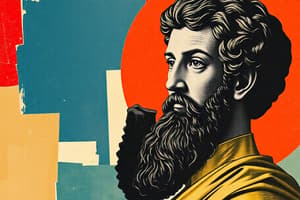Podcast
Questions and Answers
What is the primary proposition that most philosophers agree on regarding 'the self'?
What is the primary proposition that most philosophers agree on regarding 'the self'?
The mind-body duality
According to Socrates, what constitutes the true self?
According to Socrates, what constitutes the true self?
The soul
What are the three parts of the soul according to Plato?
What are the three parts of the soul according to Plato?
- Appetite (correct)
- Reason (correct)
- Emotion
- Spirit (correct)
What method does Socrates use to help individuals know themselves?
What method does Socrates use to help individuals know themselves?
Augustine of Hippo believed that the self is solely the mind.
Augustine of Hippo believed that the self is solely the mind.
What phrase did René Descartes use to express the connection between doubt and existence?
What phrase did René Descartes use to express the connection between doubt and existence?
According to Plato, the rational part of the self is called ___.
According to Plato, the rational part of the self is called ___.
What does the Pineal Gland represent in Descartes' philosophy?
What does the Pineal Gland represent in Descartes' philosophy?
Flashcards are hidden until you start studying
Study Notes
Understanding the Self
- The question "Who are you?" prompts varying answers influenced by different contexts and perspectives, highlighting the complexity of the self.
- Multiple disciplines attempt to unravel the nature of the self, each providing unique insights.
Philosophical Perspectives
- Philosophers are among the first to explore the concept of the self, with a general agreement on mind-body duality:
- Mind: Represents a metaphysical entity with spiritual essence, existing beyond physical reality and housing truth within thoughts.
- Body: A tangible, imperfect object that senses the world but is often misguiding.
Socratic Thought
- Socrates viewed the self as the soul, asserting that the rational soul is the true, immortal self.
- Emphasized the importance of self-knowledge through questioning, known as the Socratic method.
- Proposed that while the body is part of the self, it merely serves as a vessel for the soul.
Platonic View
- Plato, a follower of Socrates, introduced the idea of a tripartite soul:
- Reason: The rational decision-maker, sourcing knowledge and reality.
- Appetite: Represents basic, instinctual drives like hunger and sex.
- Spirit: Encompasses emotional responses, such as love and anger.
- These three parts operate dynamically and are compared to a chariot led by reason, which must control the spirited horses to maintain harmony.
- His theories align with Freud’s concept of mental structures.
Augustine’s Perspective
- Augustine of Hippo argued that true self-awareness arises from consciousness and leads to understanding God.
- Positioned humans above animals due to self-awareness and inner knowledge.
- Suggested that self-knowledge involves exploring both body and soul, unified like the Trinity.
- Stressed the importance of introspection for self-discovery.
Descartes' Philosophy
- René Descartes, the Father of Modern Philosophy, championed mind-body dualism.
- Aligned with previous philosophers, he posited that the soul houses the true self, attainable through scientific inquiry.
- Introduced "Cogito, ergo sum" (I think, therefore I am) asserting existence through the act of thought and skepticism.
- Suggested that beliefs about the self require independent verification, rather than acceptance from authoritative sources.
- Acknowledged the body as a secondary part of the self, distinct yet intertwined with the mind.
Studying That Suits You
Use AI to generate personalized quizzes and flashcards to suit your learning preferences.




